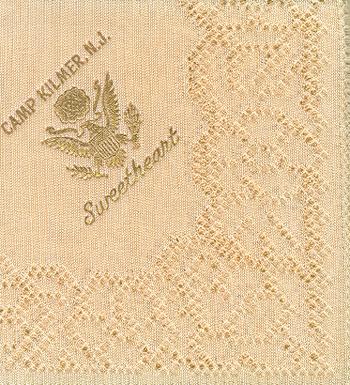"Camp Kilmer Sweethearts"
The United Service Organization (U.S.O.) was established in order to provide social clubs on America's military bases during the Second World War. Young women who volunteered to work in these clubs were given the title of U.S.O. Hostesses. The Hostesses of Camp Kilmer were given an unofficial title, the Kilmer Sweethearts. These hostesses provided a wide range of services including serving food, dancing with the soldiers etc. They also visited sick and wounded soldiers in America's hospitals. The U.S.O. also organized shows for Allied servicemen both at home and abroad. Many big stars of the era volunteered to participate in these shows.
The following quotes give a snapshot of some of the experiences a few of the Sweethearts had while at Camp Kilmer.

- "Well, your father was drafted, and after a year of just sitting around, my sisters and I joined the U.S.O. We joined through St. Peters and we would get on a bus that dropped us off right in front of the front door. At the end of the night, you got right back on the bus. We would arrive with cookies and items we had baked, and we would serve hot dogs and sandwiches. And of course we danced with the men" Eleanore DeFellipo Yusko.
- "You had to stay inside the canteen and you could not give out your phone number…but rules are made to be broken, and in fact that's how I met my husband!" Mrs. Dowdy.
- "You felt like the belle of the ball, one soldier after another would cut in to dance with you!" Eleanore DeFellipo Yusko
- "We would write to the boys, especially boys who had no one to write to them, and I knitted a lot!" Eleanore DeFellipo Yusko.
- "I wrote to so many servicemen, so I began to keep a map. Each time I received a letter, I placed a new star on the map; just nice, friendly letters to keep up their morale." Paula DeFellipo George.
- "We also visited with the wounded boys in the hospital, and many of them were badly hurt. When you went to the hospital, you mainly talked and wrote letters for them. The hospital visits, that was the most difficult job I did with the U.S.O." Eleanore DeFellipo Yusko.
- "Well. Camp Kilmer was a main point of debarkation for boys heading overseas, so of course each serviceman tried to work on you by telling you: 'I'm heading overseas tomorrow.' Eleanore DeFellipo Yusko.
- "Yes, the army was segregated so there was a separate U.S.O. for the black servicemen across the street in the small building which is now the Stelton Restaurant." Paula DeFellipo George.
- "We were happy to serve in any way we could, to support the boys. Maybe we were just naïve, but we just did not think in terms that many might not return." Paula DeFellipo George.
Questions and Activities
- Explain why you feel the U.S.O. did or did not serve an important function during World War Two.
- Examine the "Kilmer Sweetheart" doily (handkerchief) given to Eleanore and the other Kilmer U.S.O. Hostesses, and read the quotes of women who served as Kilmer Hostesses during World War Two. Would young ladies be eager to serve in such a capacity (if the need were to arise) today? Why or why not?